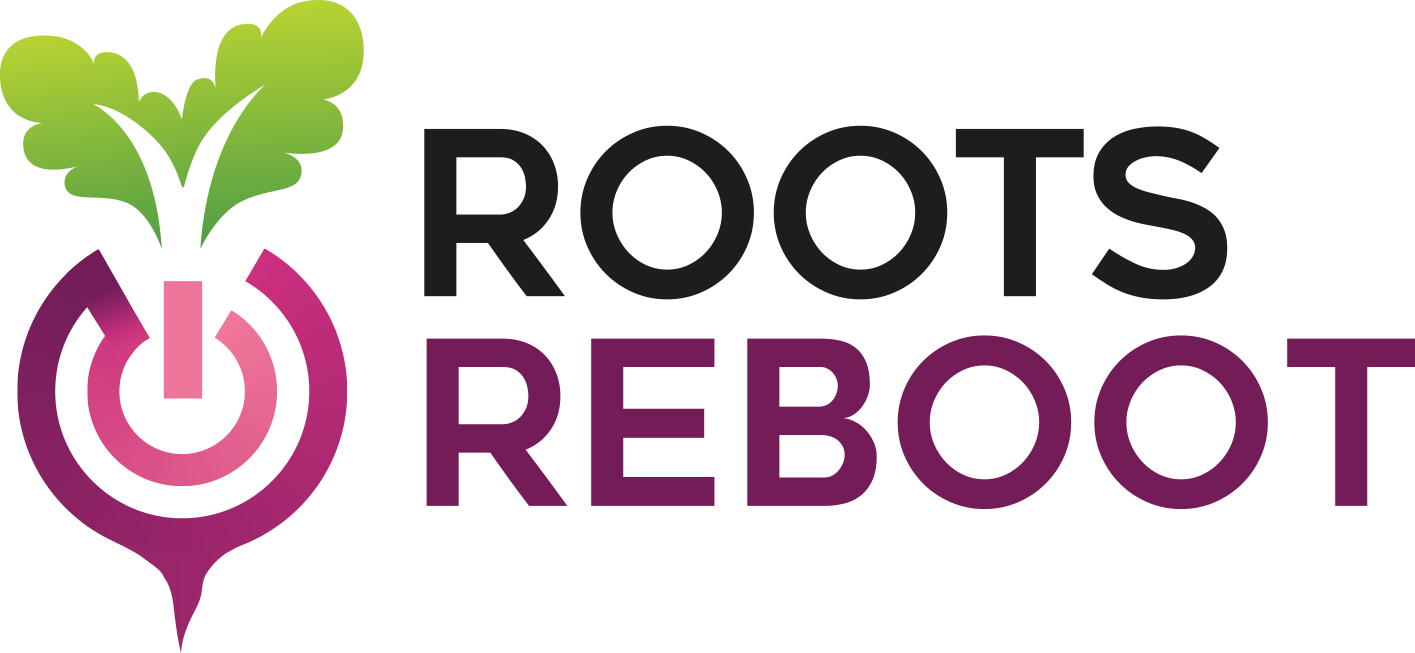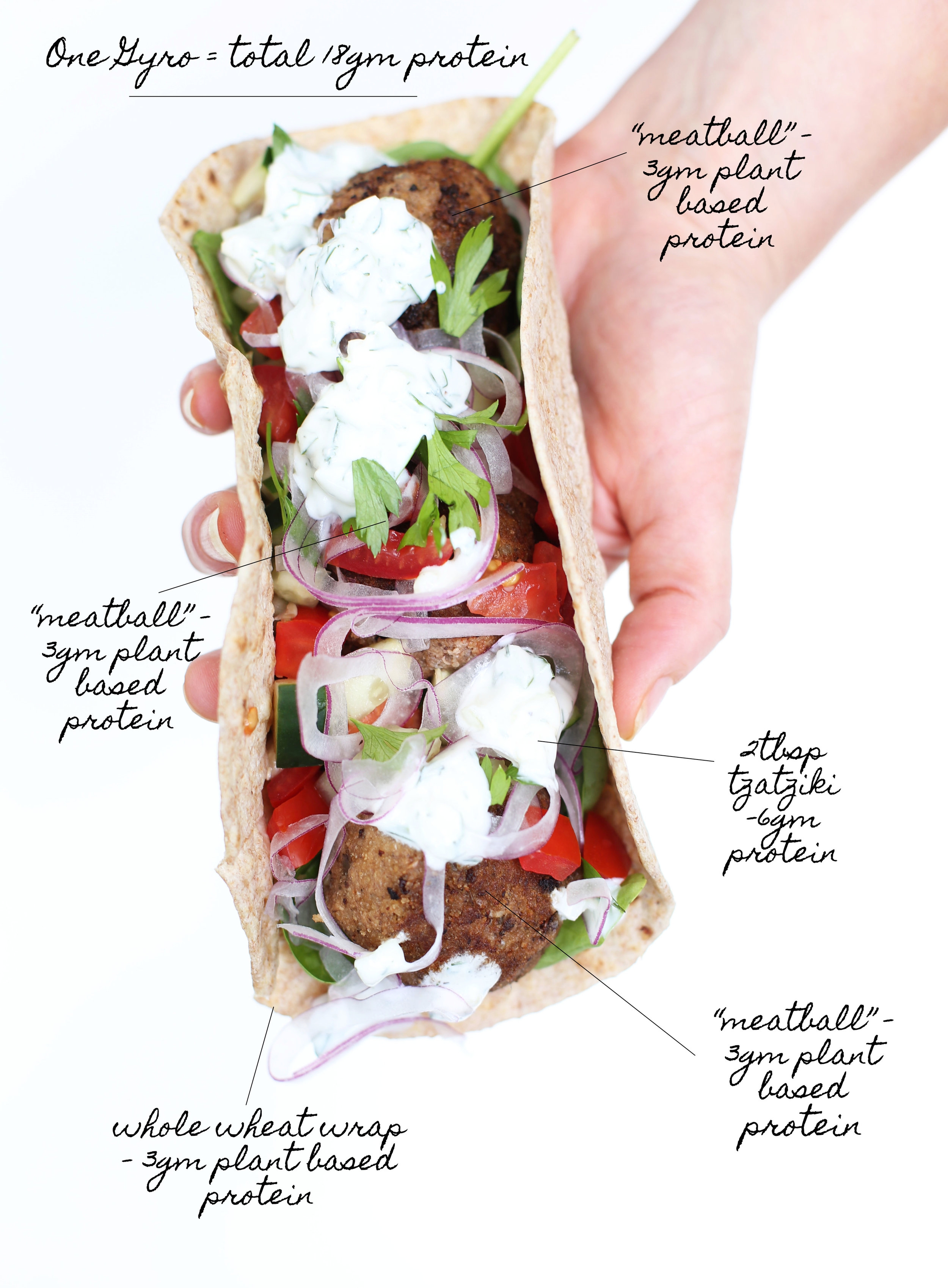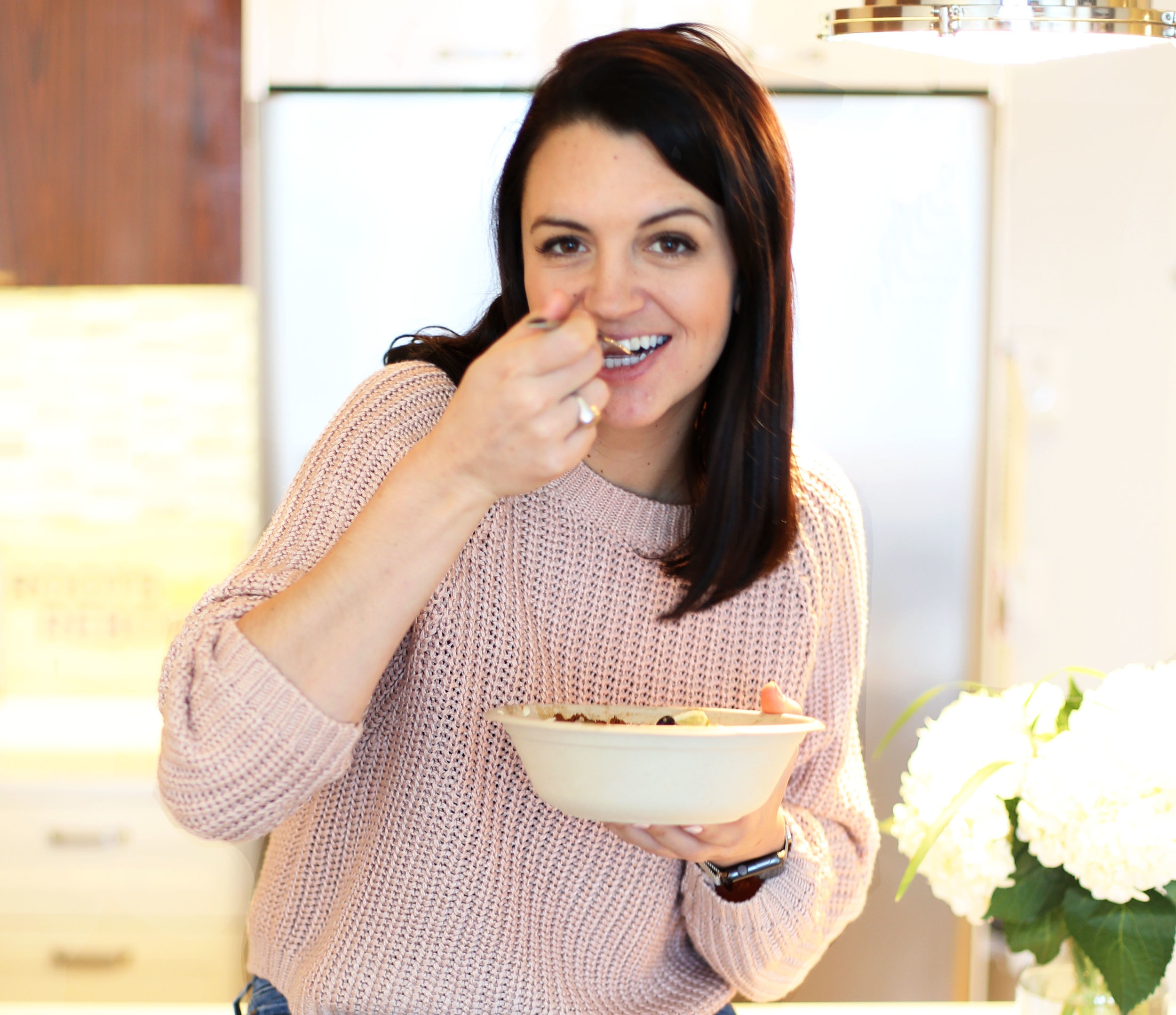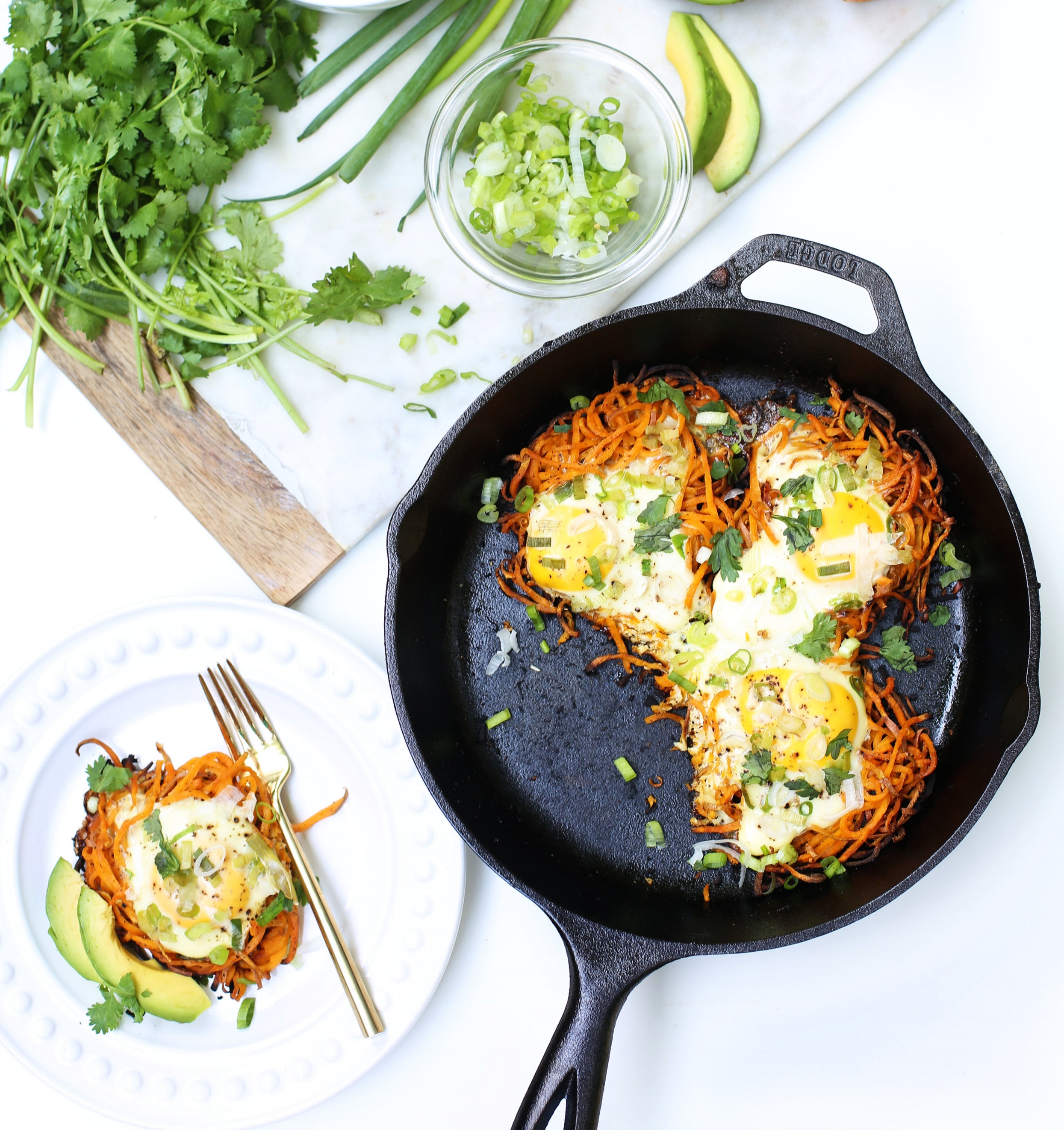It doesn't have to be Monday to go meatless!
Whether you want to eat seasonally, sustainably or more plant based for your health, getting more meatless meals like this is a great way to kick off your week! Plus, cutting back on your meat intake doesn't mean your limiting how delicious or filling your meals can be! Going more plant based has personally made me feel amazing and allowed me to experiment with different vegetables, flavors and combinations, ultimately diversify my diet with the nutrients that go along with eating new whole foods!
Okay, Lets Talk Protein.
First off, I am not here to argue in eating minimally processed animal products/foods that are raised by small, local farmers who utilize sustainable and humane agricultural practices. These foods, and ANY foods "good" or "bad" for that matter (there shouldn't be good/bad labels or fear of ANY foods - that's another topic for discussion) can be included in a healthful diet when consumed as part of a predominately plant-based diet. Instead, I am here presenting not on my beliefs but, the most up-to-date evidence from clinical studies you should be informed of. My hope is that everyone will choose to eat more whole foods for your overall health with great respect for the environment and rights and welfare of others.
Ask the RD: Why should I decrease my meat intake?
The evidence continues to pour in from studies across the board that diets high in meat – especially red meat and processed meat – have been repeatedly associated with an increased risk of obesity, type 2 diabetes, cancer, heart disease, and premature death. Although it is true that animal products contain substantial amount of protein, vitamin B12 and iron, these foods are also high in cholesterol and saturated fat and, being at the top of the food chain, tend to accumulate pesticides and other potentially harmful substances, hormones and chemicals. According to this 16-year study, more than half a million people showed that those eating the most red meat - processed (any meat that has been smoked, cured, fermented, or has added preservatives - ex: bacon, ham, deli slices, sausage, pepperoni, etc.) or unprocessed (ex unprocessed beef, pork, lamb, veal) - had a 26% higher risk of earlier death. They also had a higher risk of dying specifically from cancer, heart disease, lung disease, stroke, diabetes, infections, kidney disease and liver disease.
Ask the RD: So what's in meat that's bad for my health?
Besides the well known cholesterol and saturated fat, two of the big health culprits in red meat are heme iron (iron from animal sources) and nitrate/nitrite preservatives. Both cause oxidative stress and inflammation in our bodies, increasing our risk for disease and early death. However, on the opposite spectrum, an increased consumption of cruciferous vegetables have been shown to decrease heme irons potential for oxidative stress. Also when we eat, we are essentially also feeding our gut bacteria in our intestines. When we eat animal protein, our gut bacteria converts the high levels of choline into a toxic compound called TMOA. TMOA has been studied to worsen cholesterol plaques in our blood vessels and escalates the risk for heart disease or stroke. This is another reason to explain why vegetarians have a 25% lower risk of ischemic heart disease and an 8% lower risk of cancer; vegans have a 15% lower risk of cancer.
Well what about 'white meat' like chicken?
Chicken is less harmful than red meat yes but, if we compare chicken to beans, whole grains, vegetables, nuts or fruit, plant protein lowers mortality compared to all animal proteins. Clinical studies show that chicken should not be considered a health food as it still contains inflammatory elements like all animal protein - saturated fat, cholesterol as well as natural hormones and in most cases, antibiotics. Bottom line, try to eat white meat in moderation in a predominately plant-based diet. I recommend poultry 2-3 times per week and fish/seafood about 3 times per week. When/if possible, also try to purchase high quality animal protein when adding it into your diet by reading food labels for: organic, pasture raised. However, keep in mind, there are no clinical studies showing that a high chicken intake, whether organic or not, reverses heart disease, our #1 killer, like plant foods have.
Ask the RD: Can I meet my protein needs with vegetarian/vegan meals?
Yes. There is protein, amino acids, in literally everything - from lettuce to brown rice! While the notion that you have to combine plant proteins at the same meal in order to get a complete protein is outdated, it’s still worth noting that most plants are very low in at least one essential amino acid - lysine. So, for example while you could meet your daily protein requirements by eating nothing but brown rice, you’d need to eat over 14 cups of it in order to meet your daily requirement for lysine. Pair a cup of rice with half a cup of beans and not only would you meet your daily protein needs much more easily (and more enjoyably), but you’d also easily meet your lysine needs in one simple meal.
ask the RD: what are the best vegetarian protein sources?
Plants offer protein in a perfect package as they also offer plenty of other health promoting nutrients - fiber, vitamins, antioxidants, and a wealth of phytonutrients and best part, when going more plant based, check the portion control at the door because you can eat as much of these disease preventing foods as you'd like!
Top 9 plant-based proteins you should be eating:
1. BEANS - Considered a "starchy protein" packed with a wealth of health benefits and are great source of: carbohydrates, protein and fiber.
- 1 cup cooked beans = around 16gm protein
2. LENTILS & PEAS - Similarly to beans, lentils are also considered a "starchy protein" and much like green peas. Lentils are an amazing source of protein, carbohydrates and fiber.
- 1 cup cooked lentils = 18gm protein
- 1 cup cooked green peas = 8gm protein
3. ORGANIC TOFU / EDAMAME - Soy containing foods such as edamame, tofu and tempeh offer a complete protein containing all essential amino acids along with healthy fats and fiber.
- 1 serving of tofu or edamame = 20gm protein
5. QUINOA - this gluten free grain (technically a seed) is a starchy protein containing healthy carbohydrates, protein and fiber.
- 1 cup cooked = 8gm protein
6. NUTS + NUT BUTTERS - Not only are nuts a great source for protein but they're mineral rich such as vitamin E and particularly brazil nuts are high in selenium (in fact, 1 brazil nut a day provides 100% of your DV for selenium) and health fats.
7.HEMP, CHIA + FLAX - seeds might be small but they pack a high protein, healthy fats (such as omega-3 fatty acids) and mineral rich punch.
- 1/4 cup seeds = about 8gm protein
8. SPIRULINA - Its a deep blue-green microalgae is no question a superfood. Spirulina is rich not only in protein (70% protein by dry weight to be exact) but minerals, vitamins and antioxidants.
- 2 tbsp = 8 gm protein
9. NUTRITIONAL YEAST - A superfood packed with protein, vitamin B12 and provides a distinct cheesy flavor makes this a stable ingredient for vegetarian/vegans.
- 2 tbsp nutritional yeast = 9gm protein and is a complete protein providing all 9 essential amino acids
Greek Gyro's with Eggplant + Mushroom "meatballs"
Recipe By Dietitian: Taylor Johnson, RD, LDN
Recipe Type: Lunch or Dinner
Serves: 4-6
These meatballs are great for meal prepping ahead of time and freezing in an airtight container! I take them out to microwave or pop in the oven when I want them for not only sandwiches or wraps like this but to top on pasta, salad or a grain bowl as a meatball alternative! So yummy!
Dietary restrictions this recipe meets: Vegetarian
Dietary Substitutions: Swap out the greek yogurt in tzatziki sauce for coconut yogurt to make this dairy free and replace the egg for a "flax egg" to make this vegan. Modify whole wheat wrap to a GF version and omit bread crumbs for more quinoa to make this recipe gluten free.
Directions
Meatballs:
- Preheat oven to 400. Line large baking sheet with parchment paper.
- In a large skillet, heat a tbsp of evoo over medium heat. Add onion and mushrooms and cook until soft for about 5 minutes.
- Add eggplant, salt and pepper and cook for another 5 minutes.
- Add the garlic, paprika, balsamic vinegar and tamari and cook for additional 2 minutes or until everything is browned.
- In a food processor, pulse walnuts. Add the mushroom/ eggplant mixture and pulse 2-3 times until combined.
- Transfer the mixture to a large bowl and add the cooked quinoa, 1/2 cup whole wheat bread crumbs and raw egg.
- Mix well and form into 16 meatballs. Rolls meatballs in remaining whole wheat bread crumbs.
- Place meatballs on a baking sheet and refrigerate for about 20 minutes before putting into the oven.
- Spray or drizzle meatballs with evoo. Bake meatballs for 35-40 mins, rotating halfway through.
- Eat immediately or store in the freezer in an air tight container for up to 1 month. Add to pasta dishes, salads, or sandwiches.
Tzatziki:
- Finely grate cucumber with skin on and transfer to a thin towel or paper towel to squeeze out excess water.
- Add cucumber and remaining ingredients to a mixing bowl and mix throughly. Taste and adjust flavors as needed.
- Serve immediately or store in the refrigerator for up to 5 days.
ingredients
Eggplant + Mushroom "Meatballs"
- EVOO for drizzling
- 1 medium yellow onion, finely chopped
- 8 ounces cremini mushrooms, chopped
- 1 tsp balsamic vinegar
- 2 tsp tamari
- 1/2 cup raw walnuts
- 1 organic, pasture raised egg
- 1 cup cooked quinoa
- 1 cup whole wheat bread crumbs
- 2 garlic cloves, minced
- 1 tsp smoked paprika
- 2 tsp chili powder or red pepper flakes (add more or less for desired spiciness)
- Salt and pepper
Tzatziki Sauce
- 1/2 large cucumber, finely grated (~1 cup grated) and drained
- 2 plain greek yogurts (I use siggi's brand)
- 3 garlic cloves, minced
- 1/4 cup finely chopped fresh dill
- pinch of salt and black pepper
- 1 1/2 tbsp lemon juice
- 1 tbsp evoo for drizzling overtop
If you make these recipes, we would love to see it! Tag us in your photo @rootsreboot with
#RootsReboot or #RebootAndTurnip to our INSTAGRAM or FACEBOOK
XO - ROOTS REBOOT
P.S. NEED TO RECHARGE + REFOCUS + RESET YOUR HEALTH?
Reboot your health with a personal Roots Reboot Dietitian, your source for nutrition answers! Work one-on-one with a Roots Reboot Dietitian and start feeling amazing by achieving the whole-living lifestyle you've always desired! Creating your own personalized nutrition plan and seeing lasting results has never been easier. Skip the waiting room and speak to a Dietitian 24/7, with daily support anytime, anywhere it is most convenient for you!
LEARN MORE HERE!
Based out of Northern Virginia, Washington D.C. and Los Angeles, CA but our Dietitians provide services
NATIONWIDE via tele-nutrition!





































